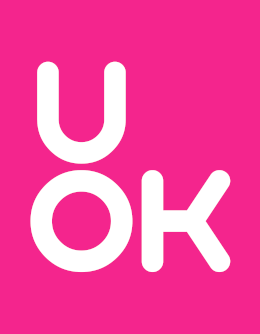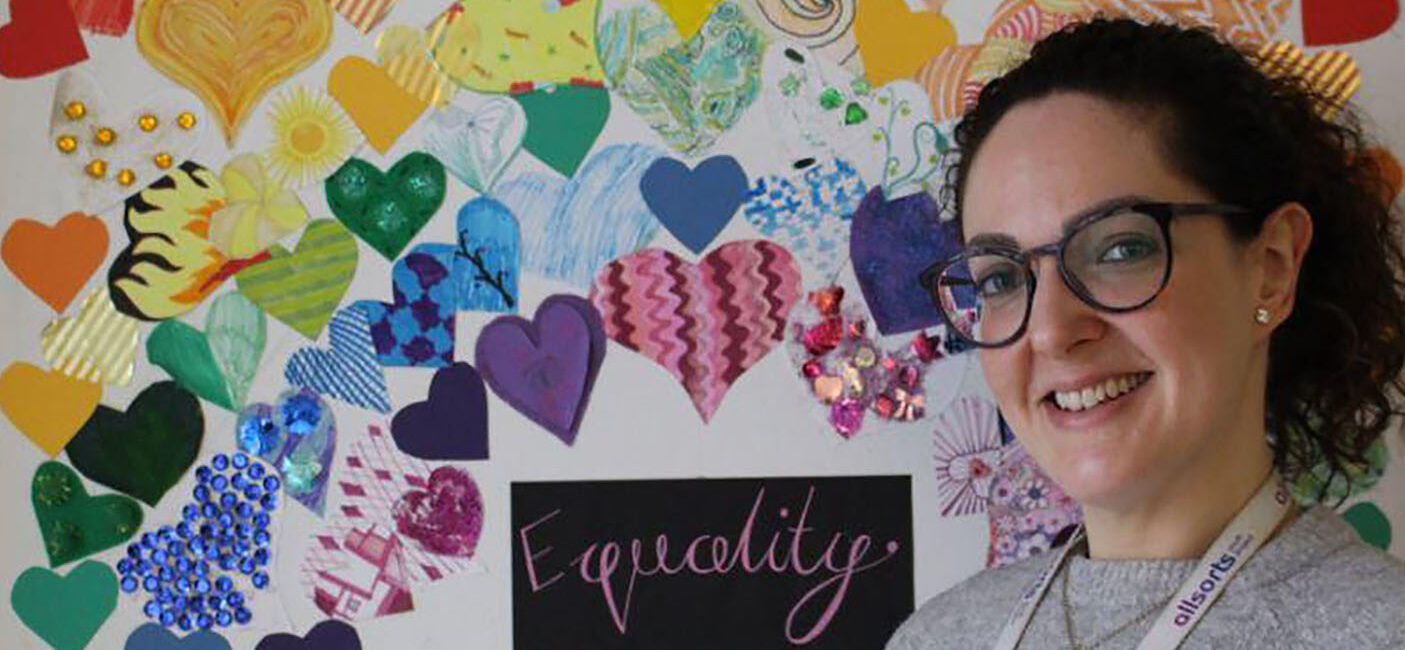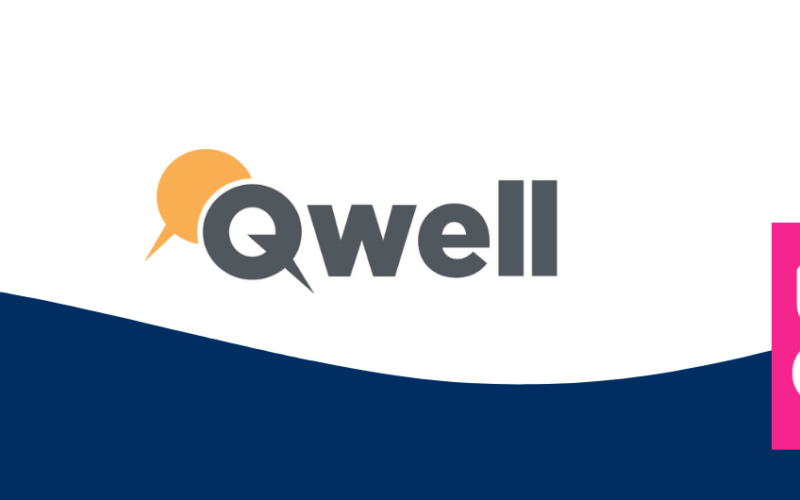It’s a real privilege to work at Allsorts and be part of the Community Roots network, to be able to have an impact on a young person’s distance travelled from struggling to thriving.
My name’s Anna and I’m an LGBTU Youth Worker at Allsorts Youth Project. I’ve been here for nearly six years now.
Being part of Community Roots is really important, not only does it validate the importance of LGBT+ provision in the city, but it makes it easier for young people to access this specialist support through a single point of access for services in the city, which is great!
LGBTU stands for Lesbian, Gay, Bisexual, Trans and Unsure. We offer safe spaces for young LGBTU people to be themselves, to explore, to be understood, to be validated exactly as they are and to reduce social isolation. We give them a space to meet other young people like them and for them to meet older LGBTU staff and volunteers, to show them that you can be LGBTU and be healthy, happy and successful. All the staff and volunteers at Allsorts are LGBT. We know what it’s like to be a young LGBTU person. We get it.
National research shows that nearly 100% of young LGBTU people experience mental health challenges. Our most recent in-house statistics at Allsorts show that 83% of our young people report experiencing challenges with their mental health and 43% of them had contemplated suicide.
National research also shows that one in two LGBTU young people self-harm, and supporting young people with managing self-harm is something that comes up a lot in our one-to-one sessions. Our young people also report a lot of challenges with food and eating, with 57% struggling with issues related to food.
Nearly 70% of our young people say that they’ve been victims of homophobic, biphobic, or transphobic incidents – in the street, at school, or in the home environment. They also speak of the homophobic, biphobic, and transphobic language used in schools and colleges – this is insidious and can be very impactful over time, contributing to feelings of shame.
We’ve made a huge amount of progress over the years but it takes time for the more insidious aspects to disappear completely. We still live in a hetero-normative and cis-normative world that tells LGBTU people they’re different, other or not ok. ‘Minority Stress’ is a term used to describe the chronic stress associated with the impact of prejudice and discrimination and identity invalidation, both subtle and overt. The pressures of identity concealment – keeping parts of ourselves hidden – can also have a significant impact on young people’s mental health, physical health and emotional development.
Just walking down the street can be really frightening for some of our young people, particularly for our trans young people, some of whom find it really difficult to go outside. It can take a lot of energy to leave the house and feel so visible and vulnerable to mis-gendering and prejudice – whether that’s perceived or actual – and a lot of energy to find the courage to use the correct bathroom or changing room.
At Allsorts, we want to see a world where young LGBTU people thrive and where there isn’t a need for our support!
As part of the Community Roots network, we offer an LGBTU 16-25 weekly safe-space Drop-In; ‘Talk It Out’ one-to-one emotional support, and monthly mental health and wellbeing group, Open Minds.
Our weekly Drop-In is a safe space group for 16-25 year olds. It aims to address social isolation by providing opportunities for LGBTU youth to connect and make friends in a safe and supportive space. We offer a range of activities at the group, from art and craft activities, to workshops, focus groups to give young people a voice on things that matter to them, games and other activities that celebrate LGBTU awareness days. We also serve a hot meal every week and young people can access a brief check-in with a staff member if they need one.
I’m the 16-25 Group Lead which means I design and deliver the majority of the activities for the Drop-In and lead the group, with support from a team of LGBT Youth Workers and Community Volunteers, who help us to set up, set down, cook for our young people and support them to participate in activities. Allsorts’ Urgent Need Advocate also attends every group and young people can access practical support and advice from her on issues related to benefits, housing, food poverty, making a complaint and so on.
We know that LGBTU young people have barriers to accessing mainstream services – due to perceived and actual prejudice – so a part of the Drop-In is to bring some of these services to them. We invite (largely LGBT) workers from other services into the group on a regular basis offering specialist support and advice on drugs and alcohol; sexual health; healthy relationships, and a team of community nurses offer health advice. We also have an LGBT Child and Adolescent Mental Health Services Assertive Outreach Worker who attends every other week to offer mental health support and act as a bridge to mainstream mental health services. Allsorts staff are also trained to offer young people C-Cards which give access to free condoms, lube, and other safe sex resources like dental dams across the city.
Once a month I lead Open Minds, a mental health and wellbeing group during our Drop-In. It’s a space for young people to talk about and explore better ways to manage their mood and mental health by using tools and strategies to help them cope in new ways, and there’s always a craft aspect, so young people have something they can take away with them. I’ve delivered sessions on topics including stress management, the Five Ways to Wellbeing, self-care and many more.
The support we provide at Allsorts is described as psychosocial support, this is because it looks at the impact of the social world and environmental factors on our internal emotional processes. Working in a psychosocial way means we support young people to develop internal and external resources that help them to cope better with challenges they may face out there in the world. We help them to build internal resources through targeted mental health work and support and external resources through opportunities for bonding in our groups, where young people can build networks of friends and support.
I also offer one-to-one support for the 16-25 age group through Allsorts’ emotional support service, ‘Talk It Out’. Talk it Out sessions are an opportunity for young people to talk about anything that might be going on for them and get some support in managing how they feel, or explore different coping strategies. Sessions are really informal and young people can write, draw or colour-in if they want to, or can sit on the floor or move around if they that makes them feel more comfortable. I have a box of different fidget toys that young people can use too if they would find that helpful.
The best part of my job is seeing young people flourish! Seeing them be proud of who they are, making friends, and feeling more confident is amazing.
It’s a real privilege to work at Allsorts and be part of the Community Roots network, to be able to have an impact on a young person’s distance travelled from struggling to thriving.
At Allsorts, we help young people know that they are not wrong, that they are perfect as they are, exactly as they are.
Allsorts Youth Project listens to, supports and connects children and young people under 26 who are lesbian, gay, bisexual, transgender or unsure of their sexual orientation and/or gender identity.


